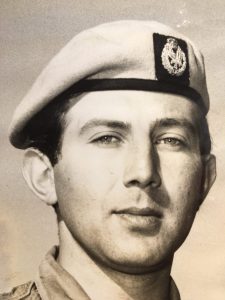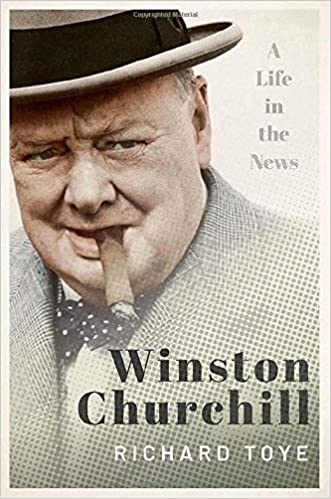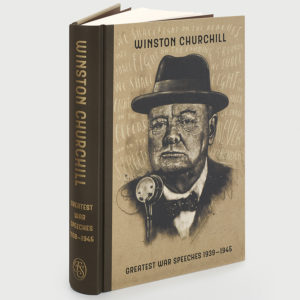
Finest Hour 191
The Legend Prints Itself

far right. Pakistani Prime Minister Mohammad Ali Bogra is standing behind Churchill.
January 1, 1970
Finest Hour 191, First Quarter 2021
Page 45
Review by W. Mark Hamilton
W. Mark Hamilton is author of The Nation and the Navy: Methods and Organization of British Navalist Propaganda, 1889–1914 (1986).
Richard Toye, Winston Churchill: A Life in the News, Oxford University Press, 2020, 378 pages, £10.99/$32.95. ISBN 978–0198803980
Churchill historian Richard Toye has written a timely and engaging volume on Winston Churchill’s long relationship with the press. He has taken the very well-documented events in Churchill’s long life and tied them to Churchill’s interactions with the newspapers and the wider media of his day. Churchill’s early career as a journalist resulted in his lifelong interest in the press—both as a major actor on the political stage and as a fanatical observer of historic events. His life began in a Victorian era notable for its conservative and fusty press and ended in the era of a liberal and popular press. Early on, he was prescient about the more aggressive style of journalism on the horizon, commenting to his supportive mother in 1898, “It is a pushing age and we must shove with the rest.”
Over the course of Churchill’s early career, Toye notes that Churchill went to war as both a newspaper correspondent and a soldier—an unusual combination at the time. He participated and reported on campaigns from India, Cuba, Sudan, and the Boer War. It was in South Africa following his capture and escape from a Boer prison camp that Churchill emerged a hero and as a widely followed war correspondent. The Boer War was a major and early “world press event,” which Churchill clearly understood and used to his advantage. In addition to the numerous newspaper articles he wrote, Churchill published several books on his war-reporting, which brought him increased attention and income and helped him launch his long political career.

2024 International Churchill Conference
Toye confirms the opinion of other recent biographers that Churchill consciously manipulated the press to his advantage and did not write solely to report events. While income from his journalism career was important to Churchill, it was not his only motivation for covering current events. Members of Parliament were not paid at the time, and Churchill’s spending habits were rather extravagant.
Churchill viewed current events through a sharp nationalistic and imperialistic lens. Labeled by some observers “the public journalist of the Empire,” he was the subject of numerous political cartoons, especially in Punch. Churchill relished this attention and was amused by the clever cartoons, but took press criticism personally and sometimes protested strongly, including taking legal action. As always, he exhibited supreme self-confidence and was considered by many to have been, in today’s parlance, a pre-1914 “spin doctor.” Churchill clearly practiced “celebrity politics.” His name and aristocratic background opened doors, giving him access to the most prominent political leaders and enabling him to move in the highest social circles, which he used to great advantage.
During his very long life and political career, Churchill blew hot and cold toward the newspapers, as he did with the press lords who owned and controlled them. Even his relationship with his close friend and press proprietor—William Maxwell Aitkin, Lord Beaverbrook—had its ups and downs. When Churchill became First Lord of the Admiralty in 1911 on the eve of the First World War and a chief promoter of the “New Navalism” (maintaining the vaunted might of the Royal Navy), he favored the Conservative-owned press, which pushed for sharply higher naval spending. He was no longer the radical social reformer and friend of the Liberal media, but instead promoted naval reviews and the launching of new ships to meet the increasing German naval threat.
Much to the delight of the newspapers, Toye notes, Churchill took up flying lessons, which served his two-pronged goal: getting front-page press attention and gaining public support for military aviation. His wife Clementine Churchill was not pleased with the flying lessons, but understood her husband well and was a strong media asset to him throughout their lives. She shared with Churchill an unabated interest in current events and was a charming hostess at Chartwell, entertaining the “great and the good” of the media.
Newspaper-backed intrigue was not foreign to Churchill, and Toye avers that on occasion, he had no objections to conspiring with the press lords for his political benefit. The press lords knew they could count on Churchill to provide “good copy” for their readers; his flair for publicity and excellent command of the written word were most welcome. Even his strong interest in painting became part of his public image, which he burnished with his essay “Painting as a Pastime,” written for The Strand Magazine.
With the coming of film and radio, Churchill became a participant; however, he always favored newspapers over other media. His attitude toward the BBC could be harsh, and he believed it was on occasion too negative, according to Toye. The advent of television had little appeal for him, and he watched it only rarely during his lifetime. He was never really comfortable before TV cameras and had little interest in appearing on television interviews, with their cameras and the glare and heat from the lights.
During the Second World War, Churchill demanded a “responsible press,” and though he did not become an active censor, he was critical of newspaper stories that could damage the war effort or could endanger Allied relations. Toye acknowledges Churchill’s “authoritarian and repressive streak.” Interestingly, Churchill’s attitude toward the American press always seemed more comfortable and relaxed, evident by his demeanor in the press conferences with President Franklin D. Roosevelt, and later with President Harry S. Truman.
Another continued focus of the press was Churchill’s health in his last years, during which rumors of his death were frequent. Speculation abounded despite considerable efforts by Churchill and his political allies to suppress information about his declining health and cognitive abilities from a series of what were thought to be debilitating strokes and mini-strokes as well as severe hearing loss. Journalists were increasingly not inclined to be discreet, Toye reports; as one journalist said, “Mr. Churchill is News!”
With Winston Churchill: A Life in the News, Toye has made another significant contribution to Churchill studies. Many other books on Churchill go into his relationship with the media, some more than others, but Toye’s is the first to focus solely on Churchill and the press. The book may not contain newly revealed facts, but it does confirm Churchill’s adeptness at manipulating the press.
Subscribe
WANT MORE?
Get the Churchill Bulletin delivered to your inbox once a month.




